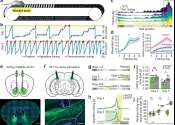Life on Earth:
Life (cf. biota) is a characteristic that distinguishes objects that have self-sustaining biological processes ("alive," "living"), from those which do not —either because such functions have ceased (death), or else because they lack such functions and are classified as "inanimate."
In biology, the science that studies living organisms, "life" is the condition which distinguishes active organisms from inorganic matter, including the capacity for growth, functional activity and the continual change preceding death. A diverse array of living organisms (life forms) can be found in the biosphere on Earth, and properties common to these organisms—plants, animals, fungi, protists, archaea, and bacteria — are a carbon- and water-based cellular form with complex organization and heritable genetic information. Living organisms undergo metabolism, maintain homeostasis, possess a capacity to grow, respond to stimuli, reproduce and, through natural selection, adapt to their environment in successive generations. More complex living organisms can communicate through various means.
In philosophy and religion, the conception and nature of life varies, and offer interpretations in the frameworks of existence and consciousness, and touch on many other related issues, such as, ontology, value, life stance, purpose, conceptions of God, the soul and the afterlife.









